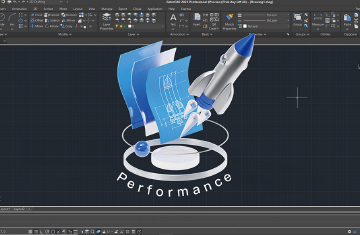What is Computer-Aided Manufacturing (CAM)?
Computer-aided manufacturing (CAM) is a type of manufacturing method that uses computer software and automatable machinery to create products with a high degree of accuracy and precision. Modern machines and software technologies have enabled us to create better parts with increasingly more control over the entire process.To get more news about designer cad, you can visit shine news official website.
A CAM tool uses a product model created in CAD software. The former converts the computer models into a language understood by the machining tool and undertakes the production.
CAM can also help manufacturers with product planning, development, management, storage and logistics.
The foremost objective of CAM is to either create new or improve upon existing manufacturing setups to boost efficiency and reduce wastage. It does so by expediting the manufacturing process and tooling, and reducing energy requirements. The final results have a high degree of consistency, quality, and accuracy.
Manufacturing Processes Automated by CAM

We can control a variety of processes with CAM systems. These processes are carried out by means of CNC machines (Computer Numerical Control). These machines follow their supplied G codes and M codes to machine a workpiece. CAM can automate the following processes.
Milling
CAM can automate the milling of workpieces in applications where there is a need for subtractive manufacturing. Through CAM, the machinists can accurately remove excess material from workpiece blocks.
The use of CAM with CNC machining enables using the data for quick quotes on machining jobs.
Turning
The turning process removes excess material from a workpiece by rotating it against the machine tool. CNC lathe machines are very efficient when creating the right order of procedure for creating the final product.
CNC can automate the different types of cutting machines to carve workpieces with phenomenal accuracy. They can also engrave workpieces as and when needed. Plasma cutting is useful for conductive materials such as metals.
Electrical discharge machines
Electrical discharge machines create parts by propagating an electric spark through them. These sparks reach extremely high temperatures enabling them to cut through any material quite easily. With CAM, we can control these sparks to cut the workpiece with a high degree of precision.
CNC routers
CNC routers use similar working logic to milling machines, removing excess material from a workpiece. They can perform a variety of carpentry operations on various materials such as wood, composites, steel, glass and plastic via CNC.
3D printing
CAM can also control additive manufacturing processes such as 3D printing effectively. With this process, CAM can manufacture virtually any shape by depositing layer upon layer of compatible materials until the desired shape is ready.
Advantages & Disadvantages of CAM
The introduction of CAM was a turning point in the manufacturing industry. It transfigured the manufacturing industry in many ways. CAM ushered in the era of flexible automation as opposed to the traditional fixed automation systems.
The modifications in a manufacturing process were easier and faster to perform. It had several other features that added immense value to a manufacturing setup. Let’s look at some of the advantages that CAM systems provided to manufacturers.